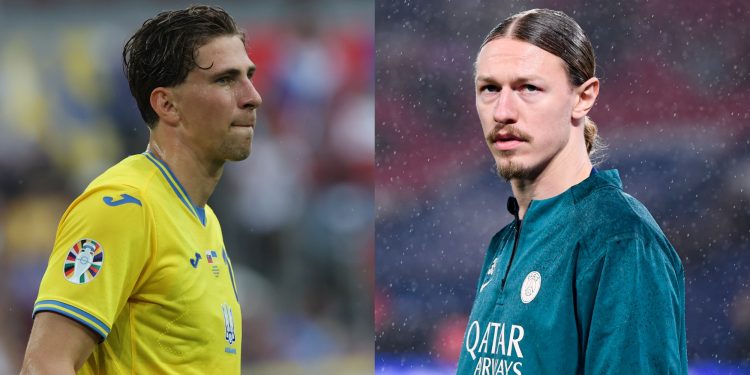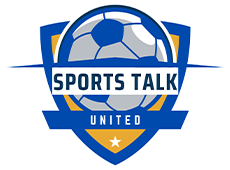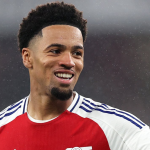At a time when the world is undergoing increasing upheaval, the link between football and politics is becoming closer every day.
Despite FIFA’s claim to be apolitical, the appearances of its president, Gianni Infantino, alongside US President Donald Trump at this summer’s Club World Cup undermine this stance.
In this context, questions arise. Among them, the one concerning the place and role of players is one of the most important.
This is especially true as their position continues to grow in influence. As conflicts multiply around the world, some footballers are no longer hesitating to speak out.
The case of Oleksandr Zinchenko is particularly telling.
A vocal opponent of Russia’s invasion of Ukraine, the Arsenal player regularly makes headlines for his actions and statements in support of his native country and its defence. To the point of even expressing his wish to see Vladimir Putin suffer the “most painful suffering death” in a post published on Instagram on 24th February 2022.
Three and a half years later, as the war continues, his position has not changed. With hindsight and increased experience on the field, it has even strengthened. In this sense, seeing him one day share the field with a Russian (or Belarusian) athlete seems inconceivable.
But what about his compatriots?
Although, at the time of writing, no club boasts players of both nationalities in its roster, the situation is about to change.
A tipping point due to the signing of Ukrainian defender Illia Zabarnyi by Paris Saint-Germain. For while the reigning European champions have secured a top-class recruit, this move still raises questions for many outside observers. In particular, because of the presence within the Parisian club of Russian international goalkeeper Matvey Safonov.
“This is a signing that will inevitably raise questions, particularly about how Zabarnyi and Safonov will coexist,” tells Jean-Baptiste Guegan, consultant, author and lecturer in sports geopolitics, to Sports Talk United.
“Both players represent their countries. And with the war still going on, tensions are bound to exist.”
But for him, there is no need for alarmism.
“Apart from that, Safonov has never taken a stand and enjoys expatriate status. So we can expect him to be a little more detached. It is clear that the sporting spirit and intelligence will prevail.”
However, PSG will also have a role to play. The way it communicates will be crucial. And here again, questions arise.
“Do we abstract the subject? Do we anticipate it? In my opinion, we will see a mixture of both,” says Guegan. As for the two parties involved, it should all be a matter of adaptation. “It’s clear that all parties (players, agents, coach, management) are aware of the situation. I think they will observe and then decide based on how relations evolve.”
And while it’s certain that PSG will do its utmost to avoid the issue of war, Guegan nevertheless points out that “it’s inevitable that journalists will ask questions about it.” And that is precisely where it will be “interesting to see how everyone positions themselves.” But also whether they will have the freedom to do so.
On their social media accounts, the two players are adopting very different communication strategies. While Zabarnyi openly displays his support for Ukraine on his Instagram profile (including a featured story called ‘War’), the situation is quite different for Safonov, who rarely makes any references to Russia. However, this does not mean that the goalkeeper is disconnected from reality.
From his reality.
If he were to be questioned on this subject, he would have to perform a linguistic pirouette to try to extricate himself from an awkward situation. “Safonov, like all Russian players playing abroad, is well aware that he cannot publicly oppose Putin,” Guegan points out. But he is not the only one who will have to juggle his words.
Zabarnyi may also have to deal with a certain form of pressure — public pressure. “The Ukrainian team immediately politicised its activities to raise awareness of its cause. In this context, it is clear that it may be difficult for him,” Guegan believes.
“He is likely to be questioned, particularly on social media, because he represents national unity and recovery in a country that is under attack, in violation of international law, and which has been subjected to increasingly harsh attacks in recent weeks.”
A crucial question then emerges. In such a delicate and unprecedented context, could PSG decide to find a way out for its number three? Not according to our expert.
“If he does leave, I don’t think there will be any political reasons behind it. Given the nature of PSG, which is the ultimate geopolitical club, this is not something that bothers them,” he explains. “If the club decides to part ways with him, it will be primarily because Safonov has not met sporting expectations.”
Used 17 times by Luis Enrique last season, the 26-year-old goalkeeper conceded 13 goals and kept seven clean sheets. All of which should consolidate his status as a backup, although the signing of Lucas Chevalier from Lille could logically call this into doubt.
But can a player bought for €20 million really be confined to the role of third-choice goalkeeper? It’s a matter of debate in most clubs, but not necessarily at PSG.
In any case, when asked by Sport24 about a potential departure, Safonov didn’t see it that way. “When was this news released? At night? I was asleep. I think you should only believe information from official media sources. The rest is not to be trusted,” he said.
Such clear statements could well cause further headaches for the Parisian management.





